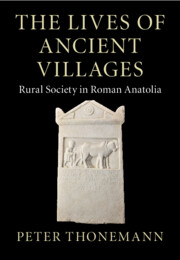
- Cited by 6
-
Cited byCrossref Citations
This Book has been cited by the following publications. This list is generated based on data provided by Crossref.
STAAB, Gregor AKYÜREK ŞAHİN, Nalan Eda and UZUNOĞLU, Hüseyin 2023. Kommemorativinschrift anlässlich der Stiftung von Opferfesten und Weihgaben durch einen Familienverband im Heiligtum von Dabla. Gephyra, Vol. 26, Issue. , p. 217.
KLİNGENBERG, Andreas 2023. Senatorial Estates in Imperial Asia Minor – State of the Question, Methodological Issues and Perspectives on Future Research. Gephyra, Vol. 26, Issue. , p. 169.
CARBON, Jan-mathieu 2023. The Power of Zeus Bronton: Notes on a New Miracle Narrative. Gephyra, Vol. 26, Issue. , p. 161.
Thonemann, Peter 2024. Romans and Greeks in Early Imperial Lydia and Phrygia. Gephyra, Vol. 28, Issue. 0, p. 9.
Petzl, Georg 2024. Nochmals zur neuen ‘Beichtinschrift’ aus Bithynien. Gephyra, Vol. 28, Issue. 0, p. 207.
Burns, James Robert 2024. ‘Slaves’ and ‘Slave Owners’ or ‘Enslaved People’ and ‘Enslavers’?. Transactions of the Royal Historical Society, Vol. 2, Issue. , p. 371.
- Publisher:
- Cambridge University Press
- Online publication date:
- October 2022
- Print publication year:
- 2022
- Online ISBN:
- 9781009128452


